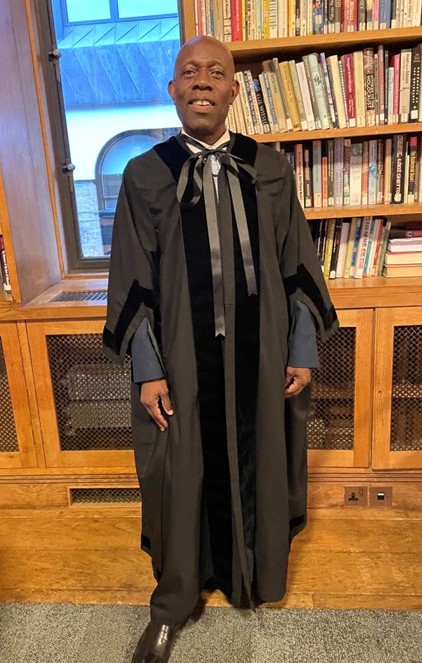What does Black History Month mean to Richard Hay JP?
Can you introduce yourself?
My name is Richard Hay and I was appointed to the Croydon Magistrate Court Bench as a magistrate on 22 December 1994, which is approaching 31 years. My appointment bucked the trend of the average profile of a magistrate in Croydon and probably London, by being black and very young.
I was born in Kennington, London to immigrant parents arriving from Jamaica in the 1950s. My grandmother Daisy was a force to be reckoned with. She ran several business and owned several houses in Jamaica, and insisted that all her children learnt a trade. My dad Douet learnt to be a welder which made him employable when he arrived in London back in the 1950s. My mother Daphne, a nurse, arrived a few months later at Tilbury Docks on a ship similar to The Windrush. They gravitated to Brixton as there was a Jamaican community based there. A Jamaican landlord rented rooms to fellow compatriots and that’s where I lived in my infant years. I remember there were signs stating ‘No Coloured, Irish or Dogs’ on many dwellings in London. So it was very difficult to find a decent place to live.

What is it like being a magistrate?
I absolutely love being a magistrate. I wanted to make a difference in my community and be a role model to others. The magistracy must reflect the community it serves in order to show all that there is fairness in the administration of justice and that the rule of law applies to everyone. Justice must be seen to be done without fear or favour.
I was very fortunate to hold several positions during my magisterial career: mentor, appraiser, youth panel chair, deputy bench chair and latterly Diversity and Community Relations Magistrate (DCRM). This is a role that I think I was born to do – telling communities about how the courts work and encouraging underrepresented groups to apply to be a magistrate. My proudest achievement is that four young black females who shadowed me are now magistrates sitting across London.
What does Black History Month mean to you and why is it important?
I think it is very important as people can be exposed to what black people contribute to society. When I was at school we learnt about Christoper Columbus et al, but I was instrumental in setting up a Black Studies Group (with two of my history teachers) so that we could learn about black people who made a difference to society. Now there are many positive role models such as Martin Luther King Jr, Nelson Mandela, Bob Marley, Usain Bolt, Oprah Winfrey, Rosa Parks, Mary Seacole, Mae Jemison, etc. However there is still a long way to go to show that anyone can make a mark in our society regardless of skin colour.
Do you have any black role models who have paved the way, or can you share an important piece of advice that was given to you?
I was a member of Operation Black Vote that encouraged black people to apply for various roles such as MPs, councillors and magistrates. I was very impressed by Simon Woolley the director. His charisma, orator skills, and will to make change to the status quo was commendable and I learnt a great deal from Simon who is now a Lord.
I was invited to an event organised by OPV to witness the first inauguration of President Barrack Obama. I had tears of joy as I could not imagine seeing a black person being the most powerful person on earth in my lifetime. His slogan ‘Yes you can’ resonated with me to show you can achieve even though there may be obstacles and barriers.
I think my mother had some wisdom and affirmation by telling me to not follow fashion – be yourself and be the owner of the path you want to follow. She also said mediocre is not acceptable – be the best you can and reach for the stars.
I salute Ms Justice Margaret Obi, one of the first black High Court judges, appointed at the beginning of October 2025, who has been assigned to the King’s Bench Division.
What advice would you give to a black person who is considering joining the judiciary?
This is my role in a nutshell as DCRM, appointed by The Lady Chief Justice, to aim for a diverse make-up of the bench for the reasons mentioned above. I’ve learnt a great deal and acquired new skills that have enhanced my professional life. Skills such as communication, critical thinking, judgement, teamwork and active listening are all good senior management skills. I have found my role rewarding and that I really do make a difference to people’s lives – particularly in the Youth Court.
Ready to represent your community and make a difference?
If you’re looking for a meaningful way to give back, develop new skills, and help shape justice in your community, consider becoming a magistrate.
Find out more and register your interest at: I can be a magistrate
